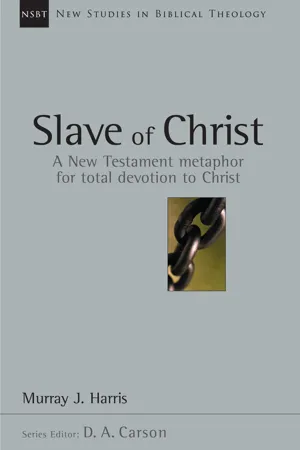
Slave of Christ
A New Testament Metaphor for Total Devotion to Christ
Murray J. Harris, D. A. Carson
- 224 pages
- English
- ePUB (adapté aux mobiles)
- Disponible sur iOS et Android
Slave of Christ
A New Testament Metaphor for Total Devotion to Christ
Murray J. Harris, D. A. Carson
À propos de ce livre
The New Testament finds many ways to depict the relationship of Christians and their Lord. They are his disciples, sons, daughters and friends. But it is perhaps too little recognized that they are also his slaves. In this New Studies in Biblical Theology volume, Murray J. Harris sets out to uncover what it means to be a slave of Christ. He begins by assessing the nature of actual slavery in the Greco-Roman world and the New Testament's attitude towards it. Drawing insights from this, he goes on to unfold the metaphor of slavery to Christ. Among the topics discussed are slavery and spiritual freedom, lordship, ownership, and privilege. Slave of Christ is a model of good biblical theology, providing insights both for future study of the Bible and for practical application. Addressing key issues in biblical theology, the works comprising New Studies in Biblical Theology are creative attempts to help Christians better understand their Bibles. The NSBT series is edited by D. A. Carson, aiming to simultaneously instruct and to edify, to interact with current scholarship and to point the way ahead.
Foire aux questions
Informations
Chapter One
Introduction
Reasons for this study
Table des matières
- Cover
- Titles in this series
- Title Page
- Dedication Page
- Contents
- Series preface
- Author's preface
- Abbreviations
- 1. Introduction
- 2. Slavery in the Roman Empire in the first century AD
- 3. The New Testament attitude towards physical slavery
- 4. Slavery and freedom
- 5. Slavery and lordship
- 6. Slavery and ownership
- 7. Slavery and privilege
- 8. ‘Slave of Christ': its significance in the New Testament
- 9. ‘Slave of Christ': four New Testament examples
- Appendixes
- Bibliography
- Index of authors
- Index of subjects
- Index of principal Greek and Latin terms and phrases
- Index of Bible references
- Index of other ancient authors and writings
- Notes
- Praise for Slave of Christ
- About the Author
- More Titles from InterVarsity Press
- Copyright